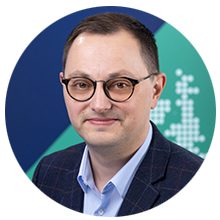Watch the webinar - AskTheExpert: Are robots revolutionising work in Europe?
Eurofound is organising an interactive webinar looking at the human-robot interaction in the workplace, with a live Q&A. Date: 25 November 2024. Time: 13:00 – 14: 00 Irish time (14:00 - 15:00 Central European Time).

Monday, 25 November 2024
Start
13:00
End
14:00
Event background
Watch the webinar
The debate
As advanced robots become more complex and prevalent in modern work environments, understanding how workers and robots interact and the implications for work organisation and working conditions is crucial for robots’ successful integration into the workplace.
The extent of interaction between workers and robots is expected to increase in modern workplaces due to rapid advancements in robotic technologies. Advanced robotics often leverages progress in artificial intelligence, machine learning and sensor technologies to achieve higher levels of sophistication and versatility. The enhanced capabilities of new-generation robots facilitate increased collaboration between humans and robots, partly by ensuring safety when humans and robots are working in proximity. This marks a move away from traditional robots, often confined to cages on the shop floor to isolate them from human operators.
Despite the many benefits, there are lingering concerns around the requirement for workers to continually adapt to new or changing tasks and roles, the possibility of monitoring workers’ activities at an unprecedented level of granularity, diminished autonomy and control over the pace of work, and the emergence of new health and safety risks, including of a psychosocial nature.
In this Eurofound #AskTheExpert webinar, Mary McCaughey speaks with Eurofound researchers Sara Riso and Dragoș Adăscăliței about the opportunities and challenges that come with closer human–robot interaction, and whether automation can bring in a productivity boost which could revolutionise the economy and labour market in Europe.
The speakers
 | Speaker: Sara Riso Sara Riso is a research manager in the Working Life unit at Eurofound. She is involved in research projects in the areas of employment change and restructuring. She joined Eurofound in 2006 as information liaison officer and assisted in research on restructuring and working conditions. Prior to joining Eurofound, Sara worked as manager of research projects for large Brussels-based European associations and networks. Her background studies are in psychology, communication and languages, and her main research interest is in the area of change management. |
 | Speaker: Dragoș Adăscăliței Dragoș Adăscăliței is a research officer in the Employment unit at Eurofound. His current research focuses on topics related to the future of work, including the impact of artificial intelligence on jobs, the consequences of automation for employment and regulatory issues surrounding the platform economy. He is also a regular contributor to comparative projects monitoring structural changes in European labour markets. Prior to joining Eurofound, he was a lecturer in Employment Relations at the University of Sheffield, Management School. He holds an MA in Political Science from Central European University and a PhD in Sociology from the University of Mannheim. |
 | Moderator: Mary McCaughey Mary McCaughey is Head of Information and Communication in Eurofound. A graduate of Trinity College, Dublin and the College of Europe, Bruges, she started work in Brussels with Europolitics and the Wall Street Journal Europe. She worked with the Association of European Parliamentarians with Africa (AWEPA) in South Africa during the country’s transition to democracy, and in 1998 she took up the post of spokesperson with the Delegation of the European Union in Pretoria, heading up its press and information department during the negotiation of the EU–South Africa free trade agreement. Following the end of the Kosovo War, she worked as a communications consultant for the European Agency for Reconstruction in Serbia. She took up the post of Editor-in-Chief in Eurofound in 2003. |
Image © FotoArtist/Adobe Stock
Agenda
Series: Ask The Expert webinars
Join our interactive #AskTheExpert webinars, where Eurofound researchers and invited guests present latest findings and answer your questions in real time. These sessions offer a unique opportunity to engage directly with the people behind European research.